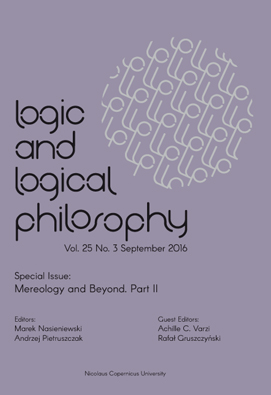Mereology and Infinity
DOI:
https://doi.org/10.12775/LLP.2016.023Keywords
mereology, infinity, axioms of finiteness, relative interpretability, second-order languageAbstract
This paper deals with the treatment of infinity and finiteness in mereology. After an overview of some first-order mereological theories, finiteness axioms are introduced along with a mereological definition of “x is finite” in terms of which the axioms themselves are derivable in each of those theories. The finiteness axioms also provide the background for definitions of “(mereological theory) T makes an assumption of infinity”. In addition, extensions of mereological theories by the axioms are investigated for their own sake. In the final part, a definition of “x is finite” stated in a second-order language is also presented, followed by some concluding remarks on the motivation for the study of the (first-order) extensions of mereological theories dealt with in the paper.
References
Bonevac, D, A., 1982, Reduction in the Abstract Sciences, Ridgeview Publishing Company.
Feferman, S., 1960, “Arithmetization of metamathematics in a general setting”,
Fundamenta Mathematicae 49: 35–92.
Fraenkel1, A., 1927, Zehn Vorlesungen über die Grundlegung der Mengenlehre; reproduced by Wissenschaftliche Buchgesellschaft, Darmstadt, 1972.
Goodman, N., 1951, Structure of Appearance, Reidel, Dordrecht.
Goodman, N., and W.V.O. Quine, 1947, “Steps toward a constructive nominalism”, The Journal of Symbolic Logic, 12: 105–122. DOI: 10.2307/2266485
Klaua, D., 1973, Grundbegriffe der axiomatischen Mengenlehre, Teil 2, Braunschweig.
Levy, A., 1958, “The independence of various definitions of finiteness”, Fundamenta Mathematicae, 46: 1–13.
Lewis, D., 1991, Parts of Classes, Blackwell, Oxford.
Niebergall, K.-G., 2000, “On the logic of reducibility: Axioms and examples”, Erkenntnis 53: 27–61.
Niebergall, K.-G., 2005, “Zur nominalistischen Behandlung der Mathematik”, pages 235–260 in J. Steinbrenner, O. Scholz und G. Ernst (eds.), Symbole, Systeme, Welten: Studien zur Philosophie Nelson Goodmans, Heidelberg, Synchron Wissenschaftsverlag der Autoren.
Niebergall, K.-G., 2009a, “Calculi of individuals and some extensions: An overview”, pages 335–354 in A. Hieke and H. Leitgeb (eds.): Reduction Abstraction Analysis, Proceedings of the 31th International Ludwig Wittgenstein-Symposium in Kirchberg 2008, Ontos Verlag, Frankfurt–Paris–Lancaster–New Brunswick.
Niebergall, K.-G., 2009b, “On 2nd order calculi of individuals”, Theoria 24: 169–202.
Niebergall, K.-G., 2011a, “Unendlichkeit ausdrücken und Unendlichkeitsannahmen machen”, pages 957–976 in C.F. Gethmann (ed.), Lebenswelt und Wissenschaft. Deutsches Jahrbuch Philosophie, 2.
Niebergall, K.-G., 2011b, “Mereology”, pages 271–298 in R. Pettigrew and L. Horsten (eds.), The Continuum Companion to Philosophical Logic, Continuum, London.
Niebergall, K.-G., 2014, “Assumptions of Infinity”, pages 229–274 in G. Link (ed.), Formalism and Beyond. On the nature of mathematical discourse, de Gruyter, Boston–Berlin. DOI: 10.1515/9781614518471.229
Parsons, Ch., 1987, “Developing arithmetic in set theory without infinity: Some historical remarks”, History and Philosophy of Logic, 8: 201–213. DOI: 10.1080/01445348708837116
Quine, W.V.O, 1975, “On empirically equivalent systems of the world”, Erkenntnis, 9: 313–328. DOI: 10.1007/BF00178004
Schmidt, J., 1966, Mengenlehre I, Bibliographisches Institut Mannheim.
Schwabhäuser, W., with W. Szmielew and A. Tarski, 1983, Metamathematische Methoden in der Geometrie, Springer-Verlag.
Shapiro, S., 1991, Foundations without Foundationalism, Clarendon Press, Oxford. DOI: 10.1093/0198250290.001.0001
Takeuti, G., and W. Zaring, 1982: Introduction to Axiomatic Set Theory, 2nd edition, Springer, New York–Heidelberg–Berlin. DOI: 10.1007/978-1-4613-8168-6
Tarski, A., A. Mostowski, and R.M. Robinson, 1953, Undecidable Theories, North-Holland, Amsterdam.
Downloads
Published
How to Cite
Issue
Section
Stats
Number of views and downloads: 858
Number of citations: 0







